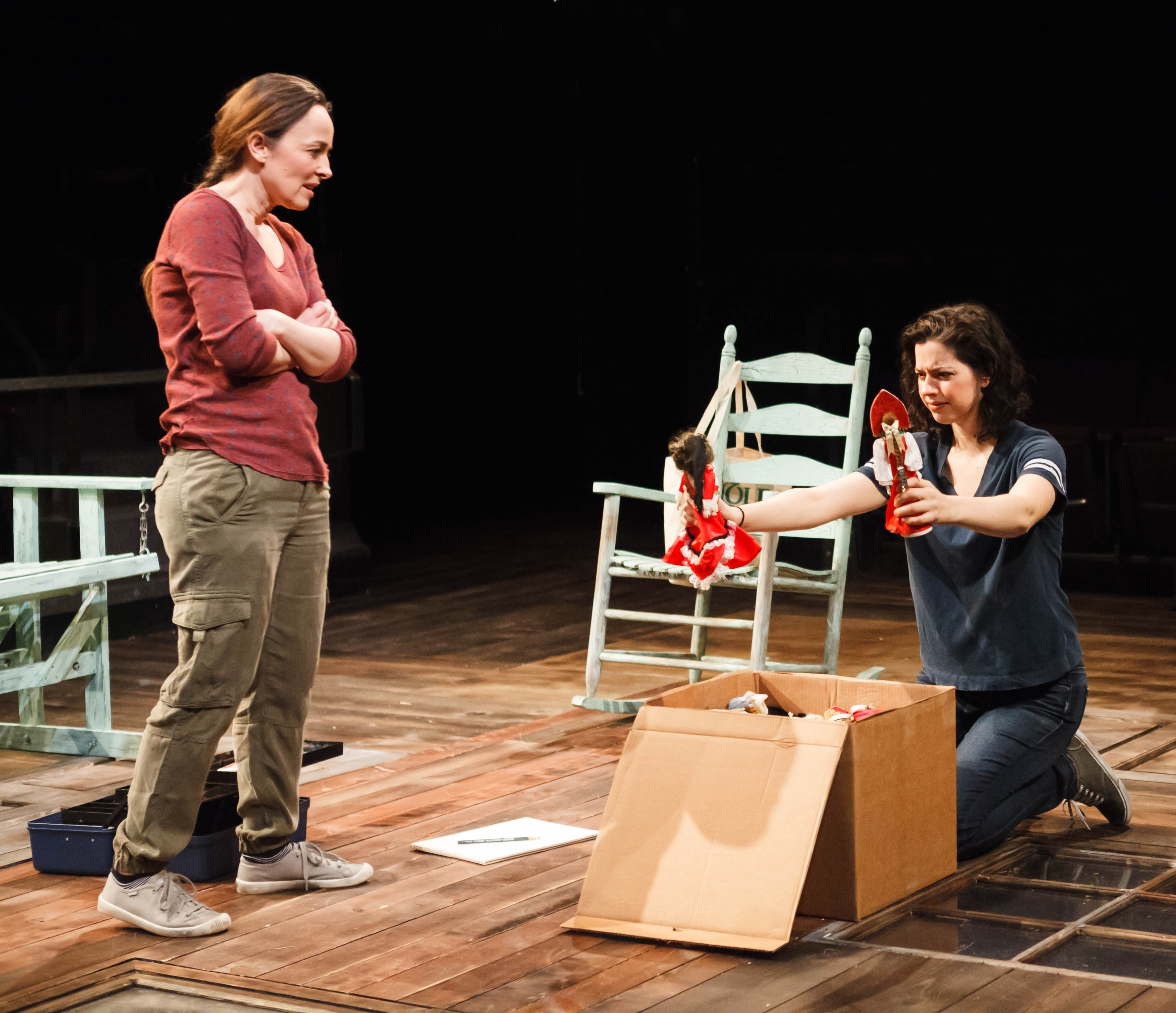Hannah Mae Sturges, Hallie Griffin, MK Kopp, & Kaitlin Paige Longoria in Hitler’s Tasters. Photo: ShPIel
Hitler’s Tasters
By Michelle Kholos Brooks
Directed by Sarah Norris
A review by Keith Waits
Entire contents are copyright © 2023 by Keith Waits. All rights reserved.
In the summer of 2021, I watched a virtual production of Hitler’s Tasters (because that was the only way to watch theatre at the time) and wrote a brief review:
“The broader waves of history are well-studied, and Adolf Hitler and the rise of the Third Reich seems an inexhaustible subject, but some of the most provocative and insightful stories can be found in the overlooked margins. That young women were pressed into service to taste der Führer’s food to verify its safety before he himself dined is in itself a curious but somewhat mundane fact, but Michelle Kholos Brooks uses it as an entry point for investigating the unquestionable risk and misbegotten honor of loyalty to a monster.
Liesl (Hallie Griffin), Hilda (Mary Kathryn Kopp), and Anna (Kaitlin Paige Longoria) enter dancing to very modern music, establishing the anachronistic position that seems crucial to the playwright’s concept, for these young women carry cell phones and speak in the shallow voices we know from a thousand insipid teen comedies. It is several minutes before the absurd situation is revealed; each meal they share is followed by an anxious hour that, if none fall ill, gives Hitler permission to dine. Liesl is a sound bridge between the status-conscious Hilda and the naive and trusting Anna as they argue and explore politics, sexuality, and a twisted infatuation with the man they protect.
The scenes are broken up by more music, dance, and ritual movement, and one of the women is replaced by Margot (Hannah Mae Sturges), a small, dark-haired spark plug for the remainder of the action.
The contemporary perspective invites us to consider many things, including the potential culpability of benign activity. There is vanity, conceit, and trite obsession about how they may benefit from their perilous duty, but little understanding that could lead to questioning why so many try so earnestly to assassinate their precious leader.
The stark and spare production contains four adroit performances. Kopp forcefully commits to a role that invites little thanks or identification, Griffin embraces the plain countenance and dedication that hold the group together. Sturges navigates the new kid dynamic with mischievous humor. Best of all was Longoria, who beautifully presented Anna as the vital, conflicted center of the play. It is in her that the illusory device of teen glibness falls away to expose the beating heart of the story.”
The production is now traveling, and the opening night performance in Louisville only deepened my appreciation of the play and this cast. It is a rare treat to see the depth and detail of performances that have developed over a significant period of time. The distance inherent in virtual anything is replaced by the immediacy of four extremely intelligent and talented actors delivering the goods, bringing dimension to characters that at first glance appear to have little.
I was again most moved by Longoria, who benefits from the way Brooks’ text positions the character as the most vulnerable and compassionate of the women but also is one of those actors who is capable of accessing emotional expression in such an authentic fashion that identification is almost impossible to escape.
I found the impact of Hannah Mae Sturges’ work to have increased the most. As much as I admired the performance before, seeing it this time felt more like a revelation, an electric and mercurial infusion of energy halfway through.
Which is not diminish the work of MK Kopp and Hannie Griffin, who lose nothing from the earlier renditions but in person render more complexity to their characters. Hilda, in particular, benefits on the live stage because the cameras just did not capture the more subtle aspects of Kopp’s performance that make the character more than the stereotypical “bitch” that is her surface.
The direct comparisons to the United States in 2023 are also much more obvious. Playwright Brooks has crafted one of the more adroit parables connecting the rise of Fascism in Germany to our recent history. Let’s face it, in the sphere of public discourse it is a notion that has been overworked into a cliche (intentionally?). So even in art, it is a challenge to capture a fresh take on it, but Brooks does it in spades. And, although not a comedy, per se, the anachronism of contemporary pop culture as identifiers for these young women and the performances makes this play an unexpected blast. A good time that stays with you long after you leave the theatre.
An-Lin Dauber’s set design is minimalist and the near abstraction is appropriately suggestive and works in effective concert with Christina Tang’s lights and Carsen Joenk’s sound. The costumes by Ashleigh Poteat are a range of fetching uniformity, and the actors change onstage in transitions so we get to see the black shorts and swastika-emblazoned white t-shirts that are emblematic of the sly humor and irony at work.
Hitler’s Tasters is a tightly constructed production, one honed to a fine edge over time. Michelle Kholos Brooks’ text takes no small risk but winds up disconcertingly relatable and engaging so that the provocative aspect will pay dividends over time. I’m certainly grateful to have had the opportunity to see it live.
Hitler’s Tasters
February 2, 3, 4, 8, 9, & 10 @ 7:30 pm Sunday,
February 5 & 12 @ 2:30 pm
ShPIeL-Performing Identity and New Light Theatre
Kentucky Center
501 West Main Street
Louisville, KY 40202
Keith Waits is a native of Louisville who works at Louisville Visual Art during the days, including being the host of Artists Talk with LVA on WXOX 97.1 FM / ARTxFM.com, but spends most of his evenings indulging his taste for theatre, music and visual arts. His work has appeared in LEO Weekly, Pure Uncut Candy, TheatreLouisville, and Louisville Mojo. He is now Managing Editor for Arts-Louisville.com.





